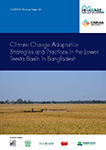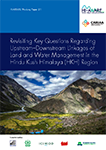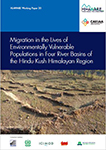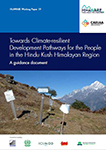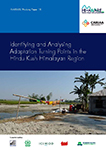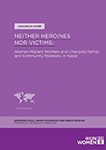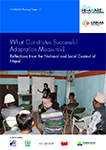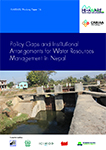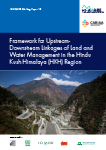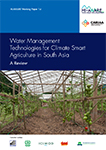Climate Change Adaptation Strategies and Practices in the Lower Teesta Basin in Bangladesh
Working Paper - 22, 2018
This study aims to deepen our understanding about local climate change trends, adaptation approaches and strategies of the government, NGOs, and other actors, and emerging adaptation practices in key impacted sectors in the Lower Teesta basin in Bangladesh. This region, regarded as one of the important food baskets of the country, has been experiencing varied changes in climate variability (including temperature rises, heat stress, low and erratic rainfall, and prolonged droughts), falling groundwater levels, and climatic extremes such as frequent and devastating floods, riverbank erosion, and thunderstorms. These climate change and other stressors are hurting sectors such as agriculture, water, sanitation and health, fisheries, food security, regional infrastructure, housing, and the livelihoods of common people in general.
Revisiting Key Questions Regarding Upstream–downstream Linkages of Land and Water Management in the HKH Region
Working Paper - 21, 2018
The activities and processes led by natural and anthropogenic factors not only change environmental variables upstream (such as land use and land cover, snowmelt, and erosion, among others), they also affect the downstream environment in terms of water availability, floods, and sedimentation. Upstream–downstream linkages (UDL) of land and water management in the Himalayan region have been widely discussed in the literature. In 1989, L. A. Bruijnzeel and C. N. Bremmer published an ICIMOD occasional paper highlighting highland–lowland interactions in the Ganges–Brahmaputra river basins (Bruijnzeel & Bremmer 1989).
Migration in the Lives of Environmentally Vulnerable Populations in Four River Basins of the Hindu Kush Himalayan Region
Working Paper - 20, 2018
This study examines the patterns of migration, and its role in building adaptive capacities of households in four river basins – the Indus, the Upper Ganga, the Gandaki, and the Teesta – of the Hindu Kush Himalayan (HKH) region. The HKH region is one of the more environmentally vulnerable areas in the world.
Towards Climate-resilient Development Pathways for the People in the Hindu Kush Himalayan Region: A guidance document
Working Paper - 19, 2018
Development is occurring against a backdrop of vulnerability to climate change. In order for development decisions to be sustainable in a changing climate they need to include choices and actions that modify climate change and its impacts and sustain development efforts over time. In the context of adaptation to climate change, adaptation pathways are proposed as a promising decision-focused approach to incorporate flexibility and account for future uncertainties (e.g. Haasnoot et al., 2013, Wise et al., 2014, Bosomworth et al., 2017).
Identifying and Analysing Adaptation Turning Points in the Hindu Kush Himalayan Region
Working Paper - 18, 2018
This framework document aims to introduce a proactive approach to assess adaptation needs and encourage timely adaptation. The idea behind this approach is that if an assessment shows that specific policies and practices of stakeholders are at risk of failure due to climate change, corrections are encouraged and losses or damages can be prevented. The approach focuses on identifying whether and when the performance of policies, management, and social-cultural practices drops below a decisive level due to climate change, and adaptation is required.
Neither heroines nor victims: Women migrant workers and changing family and community relations in Nepal (Discussion Paper)
Working Paper, 2018
In Nepal, over the last decade, the share of women migrant workers has significantly increased. Due to prevailing patriarchal norms and values and skewed policy, female labour migration is traditionally stigmatized and associated with sex work or equated to trafficking.
What Constitutes Successful Adaptation Measures? Reflections from the National and Local Context of Nepal
Working Paper - 17, 2018
Adaptation needs and options contain a wide variety of interventions, reflecting their multi-faceted nature. The study identified elements of successful adaptation measures and criteria for evaluating them for which the method of Multi- Criteria Analysis (MCA) was used. Participatory methods such as focus group discussions and interviews with key informants were included. District level workshops were organized to collate data and information.
Policy Gaps and Institutional Arrangements for Water Resources Management in Nepal
Working Paper - 16, 2018
Enhancing the capacity to adapt to climate change impacts has become a critical challenge for the developing countries. This article therefore analyzes the legal and policy aspects and institutional structure of water resource management in Nepal. Policy and institutional analysis approach is used in the research as it offers a more comprehensive framework for thinking water governance issues.
Framework for Upstream- Downstream Linkages of Land and Water Management in the Hindu Kush Himalaya (HKH) Region
Working Paper - 15, 2018
This paper develops a conceptual and generic framework design for the study of upstream-downstream linkages (UDL) in the Hindu Kush Himalaya (HKH) region. The framework application will to define changing upstreamdownstream linkages (UDL) and likely impacts on downstream regions. The results of such applications will be useful for policy makers, planners, decision makers, and researchers. It also addresses actors involved in Integrated Land and Water Resources Management (ILWRM) challenged by changing UDL processes, triggered by broader environmental changes such as climate change and human activities. This framework document defines the upstream downstream relationship. It describes the issues related to UDL mainly around land use and land cover (LULC) changes, erosion and sedimentation, climate change and infrastructure, which affect the availability of water in downstream areas.
Water Management Technologies for Climate Smart Agriculture in South Asia: A Review
Working Paper - 14, 2018
The purpose of the paper was to review selected agricultural water management technologies positioned as climate smart agriculture (CSA), in South Asia. Using the Delphi process, we shortlisted three technologies for the review: zero tillage (ZT), solar-powered irrigation pumps (SPIPs), and micro-irrigation (MI). The technologies were then evaluated on their climate smart aspects. Our analysis found that introduction of climate smart technologies leads to a rise in productivity, water, and energy savings at field level. If we extend the analysis from the field to the basin level, we observe that widespread adoption of such technologies may increase water and energy consumption, thereby offsetting the initial efficiency gains of climate smart technologies. We also found a lack of rigorous impact assessment of these technologies, indicating scope for more internally valid evaluation methodologies.

